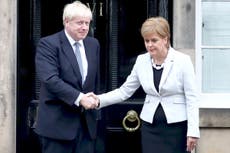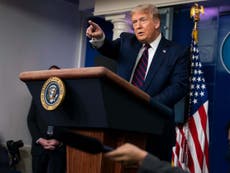The Russia report has shown our election laws are dangerously out of date
The world has changed immeasurably in recent decades. We now have access to more information than ever before, making it harder to know what’s true and what’s not

Bad information has the power to ruin lives - it can damage our health, finances and, as the Russia report noted yesterday, our democracy.
Many of the headlines yesterday focused on the influence malicious foreign actors may have wielded over the 2014 Scottish independence referendum and the 2016 Brexit vote, and rightly so.
Our election laws are dangerously out of date, leaving our elections wide open to disinformation and abuse from hostile forces everywhere - not just Russia.
The world has changed immeasurably in recent decades. We now have access to more information than ever before, making it harder to know what’s true and what’s not.
At Full Fact, we agree with the Intelligence and Security Committee’s assessment that, “our democracy is intrinsic to our country’s success and wellbeing and any threat to it must be treated as a serious national security issue by those tasked with defending us.”
And yet we still have to rely on legislation largely written in the middle of the 20th century to regulate our very 21st century elections. These laws have not been updated to defend our democratic processes from the unique threats of the so-called “Information Age”.
They are built around the old idea of adverts as fixed things that appear in the same way to an entire electorate - but that thinking belongs in a different era.
Instead, it’s now possible for candidates to run millions of different political campaigns to win one election, promising something different to each group it targets.
According to a Facebook paper leaked to journalists in 2018, President Trump, “ran 5.9 million different versions of ads during the presidential campaign and rapidly tested them to spread those that generated the most Facebook engagement.”
The law assumes we all get to see what each party puts forward. In other words, election campaigns are considered to be shared experiences. But in information terms, we are now light years away from that.
Advertising must be transparent and open to scrutiny. Urgent legislation is needed to establish a public database of online political adverts, so all paid-for political adverts can be viewed by the public in real time.
We also don’t have any laws which require the publishers of online campaigns to declare who they are and who has funded their advertising material.
Digital “imprint” rules, which would require all online political campaign material to declare who paid for it, as is the case for offline material, have still not been implemented despite urging from the Electoral Commission, parliamentary committees and civil society organisations.
This call for change is backed by the authors of the Russia report, who note that our “regulatory framework needs urgent review if it is to be fit for purpose in the age of widespread social media.”
Other forward-thinking free countries have taken actions to safeguard their elections, which have sadly not been replicated in the UK.
Under Canada’s Critical Election Incident Public Protocol, a panel of named, independent public servants are responsible for warning the public of election interference attempts.
The Canadian government has also directed significant funds towards developing programmes of digital, news and civic literacy for the public.
There is much more the UK government could do - not least delivering on long-awaited legislation to tackle online harms and improve standards of transparency from internet companies.
We agree with the Intelligence and Security Committee in its recommendation that the government should seek to establish a protocol with the social media companies, “to ensure that they take covert hostile state use of their platforms seriously.”
But if politicians really want to protect democracy in the UK then what they do matters more than what any foreign country does. All politicians need to get their facts right, back up what they say with evidence, and correct the record when they get it wrong.
Too often British democracy is let down by British politicians, not foreign interference. Just last week, Full Fact wrote to the UK Statistics Authority about our concerns over the way statistics are presented and communicated to the public, after the government falsely claimed to have hit two separate coronavirus testing targets.
The Russia report’s claims about the influence of foreign actors are alarming. But our own politicians are a more significant source of political misinformation.
As the Russia report notes, we may never know the extent of foreign interference in our recent elections. But the least the government can do is plug the gaps in our existing laws and infrastructure which have left us horribly exposed to disinformation campaigns. We all deserve better. T
Will Moy is chief executive of Full Fact, the UK’s independent fact checking charity.






Join our commenting forum
Join thought-provoking conversations, follow other Independent readers and see their replies